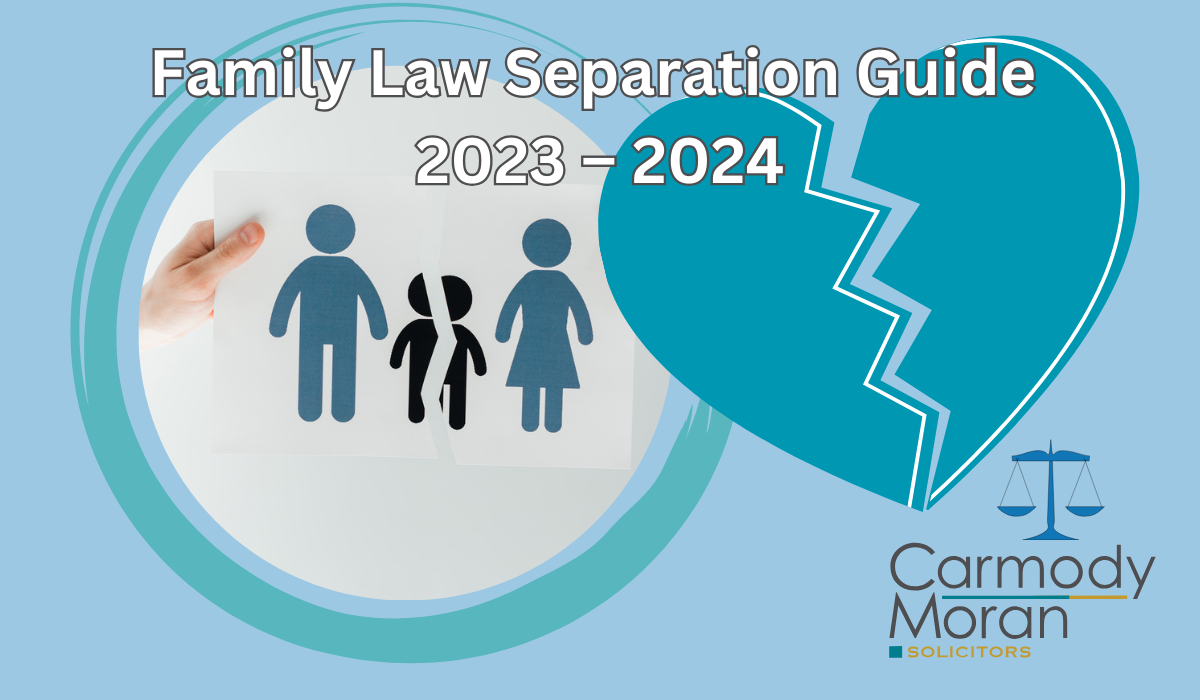FAMILY LAW SEPARATION GUIDE 2023-2024
A BRIEF SEPARATION AND DIVORCE GUIDE
WELCOME
Welcome to Carmody Moran Solicitors. We know that Separation and Divorce can seem like a minefield.
In Ireland, you must be living apart (that can be under one roof) for two out of the previous three years from your spouse to be in a position to obtain a divorce. When Separating initially, early, pragmatic, and common sense advice, can be key to navigating your finances, your future arrangements, and intended long-term arrangements.
This information guide is intended to explain in simple broad terms, the options open to you when separating and you are not eligible for a divorce.

At Carmody Moran Solicitors, we offer an initial ‘Ask the Expert’ consultation, if you wish to arrange such an appointment please telephone (01) 8272888 or email us at [email protected] for more information.
MEET THE TEAM
Anthony Carmody
Solicitor, Notary Public
Anthony is a Partner practicing in family law, he is also a STEP (Probate and Estate Planning Practitioner), and expert in resolving contentious disputes.
Niamh Moran
Solicitor
Niamh is the founding partner of Carmody Moran. She is also a Chairperson with the Mental Health Commission Panel of Tribunals, and a former Director of the Legal Aid Board, and St Michael’s House.
Caila Ryan
Solicitor
Caila is a highly experienced solicitor, she has particular expertise around family and family property, and has a wealth of legal experience and pragmatism towards finding practical and workable solutions for her clients.
LEGAL OPTIONS ON SEPARATION
A legal separation allows a separating couple to work out details such as:
Property: what will happen to the family home, who will live in it.
Financial: payment of maintenance or financial adjustments, pension arrangements, lump sum financial orders, inheritance and future provision etc.
Children: who will be the primary carer for the children, what will the contact arrangements be for the other parent?
A legal separation can be reached through either a Separation Agreement or a Court Ordered Judicial Separation. You do not have to go to Court to get legally separated if you and the other party agree on the terms by which you are separating by way of a Separation Agreement. Either way you are still legally married after a legal separation and you cannot get remarried unless you proceed to obtain a divorce at a future date.
Generally, although not always, when legal arrangements are put in place to agree a separation, these provisions are made on the basis of a full and final settlement for the purposes of a future application for a divorce. If you obtain Court Orders for a Judicial Separation, this can differ, however immediate agreements do tend to continue into the future, so early, accurate, and professional advice is of the utmost importance and dealing with you separation now is dealing with your long term personal and financial situation. There are various options to work out a legal separation and we will discuss these further in this Guide.
A SEPARATION AGREEMENT
A Separation Agreement is a legally binding written contract between spouses setting out their future rights and duties. Such agreement is also known as a Deed of Separation.
The Agreement will include a number of terms, normally this will include:
- Agreement to live apart and not to interfere in the life of the other
- Arrangements on the responsibilities for dependant children (18 or 23)
- Maintenance for the support of spouses and dependants
- Arrangements as to who will live in the family home and on what financial terms
- Property ownership and arrangements with regards to mortgages, expenses etc.
- Financial adjustments
- Tax arrangements
- Succession and Inheritance
A Separation Agreement cannot make binding changes with regard to pensions. These arrangements can only be made in the context of a Judicial Separation or Divorce.
MEDIATION
Broad agreement on the contents of a Separation Agreement or heads of terms for a Judicial Separation or a Divorce, to be able to make a consent application, can be reached in Mediation with the assistance of a Mediator.
Mediation is not a legal process. The role of the Mediator is to help a couple in their own decision-making and explore the possibilities before decisions are made. If successful, the Mediation will conclude into a Memorandum of Understanding.
A draft of this Memorandum of Understanding should be brought away for legal advice before executing. to ensure you have guidance as to your legal rights and how realistic and achievable the proposals that are being discussed are and to see if they adequately protect your best interests. The Mediator cannot give legal advice to either party although they may give information around procedures and the law.
The mediated agreement is not binding until it has been put into a legally binding format drawn up by the parties solicitors known as a ‘ Separation Agreement’. Alternatively, the agreements reached can be used towards reaching agreement for a Judicial Separation or a Divorce.
JUDICIAL SEPARATION
If spouses cannot reach agreement about the conditions upon which they will separate, or if only one spouse wants to regulate the separation, an application can be made to the Courts known as a Judicial Separation.
this is similar to the process involved in obtaining a Divorce, it gives the certainty of Court Orders and the ability and access to the Court system to enforce those Orders, but unlike Divorce it does not enable you to re-marry.
in certain cases, the assets are such, or the circumstances are such, that Court protection and security is warranted. This can be particularly the situation where there are pressing and large financial arrangements that need to be addressed, domestic violence issues arising, the need for Court relief on certain matters, such as freezing orders, or urgent childcare issues.
The Court can grant an order for judicial separation on certain grounds such as:
- adultery
- unreasonable behaviour
- Desertion of a continuous period of one year or more
- No normal marital relationship has existed for at least one year.
In making such application, the Court may also make ancillary orders in relation to matters such as custody and access, financial orders, maintenance, lump sum orders, financial compensation orders, domestic violence orders, and pension adjustment orders, amongst other types of relief.
These applications can be made on consent if agreements can be reached.
NEGOTIATION THROUGH SOLICITORS
Negotiation can happen at any time in a family law case. Traditional negotiations to apply for a judicial separation on consent can happen between Solicitors either through correspondence or through a settlement meeting. An advantage of traditional negotiations is that they are relatively easy to organise, they can be informal, and flexible. There is no additional legal cost to the parties other than having their representatives present and the matter can then be concluded into a Separation Agreement or a Judicial Separation to advance on consent terms. The ease of negotiations in all cases is a major influencing factor in determining the overall costs.
NEXT STEPS
The fee for an ‘Ask the Expert’ consultation starts from €200 plus vat being €246.
To arrange an appointment in person at our office in Dublin 2 or in Dublin 15, telephone or email us and our expert team will be happy to assist.
Our office will send you a Questionnaire to review before meeting to aid and guide the discussion.
Let us take it from here
[email protected]
27 Mount Street Upper, Dublin 2
11/12 The Plaza, Main St., Blanchardstown, Dublin 15

Niamh Moran is a partner at Carmody Moran Solicitors in Dublin. Niamh’s litigation experience includes injury claims law (both Plaintiff and Defendant) and is an Advisory Board Member of the State Claims Agency.


